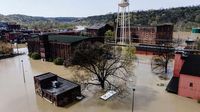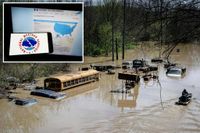The National Weather Service has halted language translations for its products, a decision that experts warn could endanger non-English speakers during extreme weather events. The agency announced that it "paused" these translations after its contract with Lilt, an artificial intelligence company, lapsed. Lilt had been providing translations since late 2023, transitioning from manual interpretations that the NWS deemed labor-intensive and unsustainable.
Lilt's translation services included Spanish, Chinese, Vietnamese, French, and Samoan. According to the U.S. Census, nearly 68 million people in the United States speak a language other than English at home, with 42 million of those being Spanish speakers. This demographic shift highlights the critical need for accessible weather information in multiple languages.
Joseph Trujillo-Falcón, a researcher at the University of Illinois Urbana-Champaign, emphasized the potential consequences of this decision. He pointed to the deadly tornado outbreak in Kentucky in 2021 as a stark example of how language access can save lives. A Spanish-speaking family during that disaster initially ignored English warnings on their phones, only taking shelter when they received alerts in Spanish. "It saved their life," Trujillo-Falcón remarked, underscoring the life-or-death stakes involved in weather communication.
Norma Mendoza-Denton, a professor of anthropology at UCLA, echoed these concerns, stating, "If they don’t have access to that National Weather Service information in the different languages, that could be the difference between life and death for somebody." The absence of timely and comprehensible weather alerts could leave vulnerable communities unprepared for severe weather.
Andrew Kruczkiewicz, a senior researcher at Columbia Climate School, added that the implications extend beyond immediate safety. He warned that unreliable access to weather forecasts could disrupt daily life for millions, affecting tourism, transportation, and energy sectors. The National Weather Service has acknowledged that this overhaul could compromise their ability to monitor and predict extreme weather, a critical function as climate-induced disasters become increasingly frequent.
This decision comes against a backdrop of broader changes within the National Oceanic and Atmospheric Administration (NOAA), which oversees the NWS. Layoffs began in February 2025, with hundreds of weather forecasters on probationary status losing their jobs. This reduction in workforce has raised alarms among lawmakers and experts about the agency's capacity to respond effectively to extreme weather events.
Senator Maria Cantwell, a prominent member of the Senate Commerce Committee that oversees NOAA, criticized the firings, stating, "The firings jeopardize our ability to forecast and respond to extreme weather events like hurricanes, wildfires, and floods—putting communities in harm’s way." This sentiment reflects a growing unease about the federal government's commitment to public safety in the face of climate change.
As the National Weather Service navigates these changes, the implications for non-English speaking communities remain a pressing concern. The cessation of translation services is not just a bureaucratic oversight; it is a potential public safety crisis. With millions relying on accurate and timely weather information, the ability to communicate effectively across language barriers is more crucial than ever.
In light of these developments, advocates for language access are urging the NWS to reinstate translation services as soon as possible. The message is clear: when it comes to weather alerts, every second counts, and every life matters. The ongoing dialogue around this issue will undoubtedly shape how the NWS approaches language access in the future, particularly as climate-related disasters continue to escalate.
The National Weather Service's recent decision serves as a reminder of the essential role that clear communication plays in safeguarding lives. As communities across the nation brace for the potential impacts of climate change, ensuring that all individuals have access to critical information, regardless of the language they speak, is imperative.





